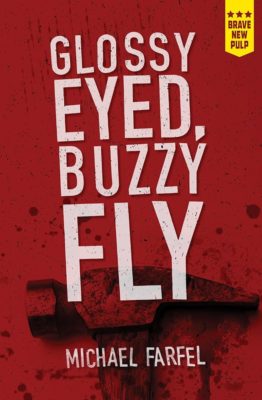
Anti-Protagonists and Anti-Detectives in Michael Farfel’s Glossy Eyed, Buzzy Fly
Book Reviews
“A Michael Farfel story leaves reality eventually,” says the author of Glossy Eyed, Buzzy Fly. His most recent work proves no exception. Presenting as a tale of a private eye trying to solve a murder, Farfel’s work sheds its skin almost instantly. After editor Ricky Maroon is found brained over a copy of an unpublished manuscript, the titular Fly must call upon Vivian, a woman who is able to visualize what an author looks like after reading their work. With his new psychic friend, the Fly crosses the threshold into the unreal.

Before GEBF left reality, it first had to leave Farfel’s head. The author had just published his first novel, The Reluctant Journey of Manfred Bugsbee, and was unsure of what was next. “The first chapter was really just me forcing myself every day to sit down [and write]. I committed myself to making something new and not giving up.” Farfel’s uncertainty and drive prodded him to write about the very thing he found difficult: limitations.
“When you read a good Batman comic, you’re entering into Gotham. You get to release all that like human physiological mumbo jumbo, and be in a different space.”
“I was definitely thinking a lot about the power of thresholds,” recounts Farfel, “of how to engage and articulate [the idea that] you were here in your life, you cross over this barrier and suddenly just everything shifts.” Inspired by the works of Paul Auster, Haruki Murakami and Yoko Agawa, Farfel gives this idea many forms in the novel: before he is “the Fly,” the novel’s protagonist is an unnamed detective. After he is named, “the Fly” becomes an integral part of a complex web of criminal connections, conspiracy and antagonistic angels who break the laws of reality.
Told through the Fly’s eyes, GEBF’s narrative is limited by the first person. While part of this is to underscore the central mystery of the book, it also serves to underline the limits of the body. The Fly does not so much drive the narrative as he stumbles through it, knocked unconscious at critical moments and hallucinating through others. The resultant effect highlights the vulnerability of the mortal frame: a “sneezing, shitting entropy machine.”
While the body is presented as a limiting factor, Farfel also uses GEBF to explore its possibilities. The aforementioned antagonistic angel is Awago, a metaphysical being whose physicality changes with every appearance. While the physical form is the Fly’s primary constraint, it is how Awago expresses freedom.
Each time Awago appears from the ether to wreak fresh havoc on the enemies of the Fly and his allies, their physicality is different. Sometimes masculine, usually feminine and always sporting distinctive traits like dyed hair, Awago’s shifting appearance is an ultimate form of control over the vulnerability and fallibility of a body.
Farfel also introduces us to Larsky, a stunningly tall, Frankensteinishly handsome man. Striking in appearance, Larsky is most notable for the metaphysical hole to the realm of creativity inside of him. “Crawling into that hole is the way I read comics as a child,” says Farfel, “[but] it is a bit of a philosophical problem.”
“I was definitely thinking a lot about the power of thresholds of how to engage and articulate [the idea that] you were here in your life, you cross over this barrier and suddenly just everything shifts.”
In Larsky’s body, Farfel draws attention to the ultimate threshold: that of reality and fiction. “When you read a good Batman comic, you’re entering into Gotham. You get to release all that like human physiological mumbo jumbo, and be in a different space.”
Art asks the perceiver to leave their own reality and trespass the threshold of a new one, leaving their old behind. GEBF continually asks its readers to transgress their own bodies from our world into an ever-layered realm of strange realities. “It is the necessities that make them inextricable” writes Farfel.
Fiction, however you want to define it, summons us with its clarion call, and, though we can never fully become a part of it, we are unable to resist trying. To read Glossy Eyed, Buzzy Fly, ask for it at your local bookstore or order it off Amazon. Hopefully, you can melt into its pages.
Read more coverage of Utah authors:
“Something Super Bizarre and Fucked Up”: Literature as Play with Author Michael Farfel
“Crooked Solace”: Bailee Elaine’s Short Sweet (and F*cking Brutal)
